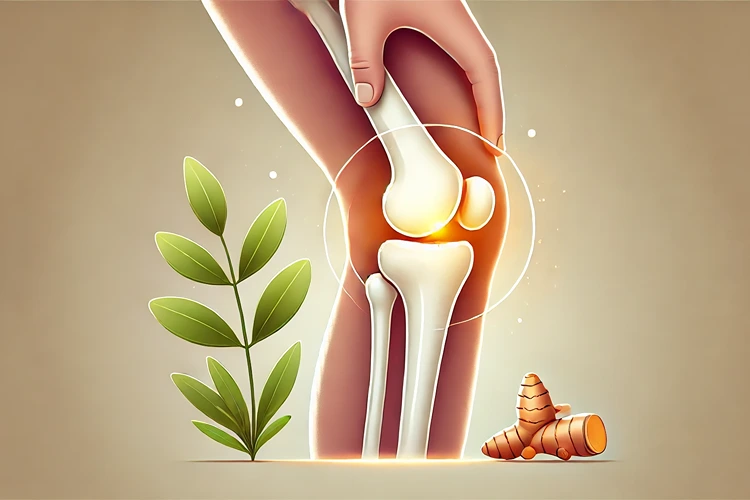
Curcumin’s Role in Reducing Inflammation in Osteoarthritis Patients
Osteoarthritis, a common condition affecting millions globally, can cause severe joint pain, stiffness, and inflammation. Many people suffering from osteoarthritis are searching for natural alternatives to manage the symptoms. One such option gaining significant attention is curcumin. Derived from turmeric, curcumin is known for its powerful anti-inflammatory properties. But what exactly makes curcumin beneficial for osteoarthritis patients?
The focus keyphrase, “curcumin’s role in reducing inflammation in osteoarthritis patients,” highlights its potential to alleviate inflammation, a core issue in osteoarthritis. When consumed regularly, curcumin may reduce swelling and discomfort, allowing patients to experience more freedom of movement. In this article, we’ll explore how curcumin works, the science behind its effects, and practical ways to incorporate it into your daily life.
How Does Curcumin Fight Inflammation in Osteoarthritis?
Inflammation is a natural response in the body to injury or infection. In osteoarthritis, inflammation becomes chronic, leading to ongoing pain and joint damage. Curcumin, the active compound in turmeric, has been studied extensively for its ability to reduce inflammatory markers in the body. But how does it do that?
Curcumin inhibits the production of pro-inflammatory molecules such as cytokines and enzymes, which are elevated in osteoarthritis patients. These molecules contribute to the breakdown of joint cartilage and exacerbate pain. By targeting these inflammatory pathways, curcumin can slow the progression of joint damage and offer relief from the constant discomfort of osteoarthritis.
Is Curcumin a Safer Option Than Traditional Pain Relievers?
Many osteoarthritis patients rely on nonsteroidal anti-inflammatory drugs (NSAIDs) like ibuprofen to manage pain. While these medications are effective, they come with potential side effects, including gastrointestinal issues and increased cardiovascular risk. Curcumin, on the other hand, is considered a safer, more natural alternative for long-term use.
Several studies have compared the efficacy of curcumin to NSAIDs, finding that curcumin may be just as effective in reducing inflammation, with fewer adverse effects. This makes it an appealing option for patients who prefer a natural approach or cannot tolerate the side effects of conventional medications.
What Does the Research Say About Curcumin for Osteoarthritis?
Numerous studies have focused on curcumin’s impact on osteoarthritis. One significant study published in the journal *Phytotherapy Research* found that osteoarthritis patients who took curcumin supplements experienced reduced pain and improved joint function compared to those on NSAIDs. Another study published in *Clinical Interventions in Aging* noted a reduction in inflammatory markers in patients treated with curcumin.
The findings are promising, suggesting that curcumin can be an effective alternative for reducing inflammation and managing the symptoms of osteoarthritis.
How to Incorporate Curcumin into Your Diet for Osteoarthritis Relief
Curcumin is widely available in various forms, from dietary supplements to turmeric powder. To gain the maximum benefit for reducing inflammation in osteoarthritis patients, it’s crucial to know how to incorporate curcumin into your daily routine effectively.
- Turmeric Spice: Add turmeric to your meals, such as soups, stews, and smoothies. Black pepper enhances curcumin’s absorption, so consider adding a pinch for better results.
- Curcumin Supplements: Look for high-quality curcumin supplements that contain black pepper extract (piperine) to increase absorption. Follow the dosage instructions on the supplement packaging.
- Golden Milk: This popular drink combines turmeric, milk (or plant-based alternatives), and spices to create a delicious and anti-inflammatory beverage. It’s a great way to boost your curcumin intake daily.
Are There Side Effects of Taking Curcumin for Osteoarthritis?
Curcumin is generally well-tolerated, but some people may experience mild side effects such as stomach upset, nausea, or diarrhea. It’s always best to consult with a healthcare provider before starting any new supplement regimen, especially if you’re taking other medications or have underlying health conditions.
Helpful Hint:
When taking curcumin supplements, look for those that contain piperine, a compound in black pepper that enhances absorption. Without piperine, curcumin has poor bioavailability, meaning your body won’t absorb it as effectively.
Can Curcumin Slow the Progression of Osteoarthritis?
While curcumin is not a cure for osteoarthritis, it may help slow the progression of the disease. By reducing inflammation, curcumin can protect joint cartilage from further damage. Research suggests that long-term use of curcumin may help preserve joint function, offering patients a higher quality of life as they manage their condition.
Stats:
A 2016 study published in the journal *Osteoarthritis and Cartilage* found that osteoarthritis patients who took curcumin supplements for 12 weeks showed a significant reduction in pain and stiffness compared to those who took a placebo.
How Much Curcumin Should Osteoarthritis Patients Take?
When considering curcumin for reducing inflammation in osteoarthritis patients, dosage is key. Taking too little may not yield the desired effects, while too much could cause unwanted side effects. So, how much curcumin is ideal for osteoarthritis management?
Most studies on curcumin for osteoarthritis suggest a dosage between 500 to 2,000 milligrams per day. It’s important to note that curcumin has low bioavailability, meaning the body absorbs only a small percentage of it. Therefore, finding supplements that contain piperine, or black pepper extract, can help increase absorption by up to 2,000%.
However, it’s always wise to consult with a healthcare professional to determine the appropriate dosage based on individual needs and health conditions.
Can You Get Enough Curcumin from Food Alone?
While turmeric is an excellent source of curcumin, it only contains about 3-5% curcumin by weight. This means you’d need to consume large amounts of turmeric daily to achieve the anti-inflammatory benefits needed to combat osteoarthritis symptoms. For most people, this isn’t realistic through food intake alone.
To maximize the benefits of curcumin’s role in reducing inflammation in osteoarthritis patients, supplements are often recommended. These supplements contain concentrated amounts of curcumin, making it easier to reach therapeutic levels.
Helpful Hint:
If you prefer using turmeric in cooking, combine it with healthy fats like coconut oil or olive oil. Curcumin is fat-soluble, which means it’s absorbed better when consumed with fats, increasing its effectiveness.
Common Dosages and Forms of Curcumin for Osteoarthritis
| Curcumin Form | Recommended Dosage | Best Absorption Method |
|---|---|---|
| Curcumin Supplements (Capsules) | 500-2,000 mg/day | With piperine (black pepper extract) for enhanced absorption |
| Turmeric Powder (in food) | 1-2 teaspoons/day | Combined with black pepper and healthy fats |
| Liquid Curcumin (Tinctures) | 500 mg/day | Added to water or smoothies for quicker absorption |
| Curcumin Gummies | 2-4 gummies/day | Best taken with a meal for better absorption |
What Are the Best Forms of Curcumin Supplements for Osteoarthritis?
Curcumin supplements come in various forms, and knowing which one is right for you can make a significant difference in managing your osteoarthritis symptoms. Here are the most common forms of curcumin supplements available:
- Standard Curcumin Capsules: These are the most widely available and typically contain piperine to boost absorption.
- Curcumin with Liposomal Technology: Liposomal curcumin uses a special technology that encases the curcumin in liposomes (fat-like molecules), allowing for enhanced absorption and bioavailability.
- Liquid Curcumin: Available in tinctures or drops, liquid curcumin can be a more convenient option for people who have trouble swallowing pills. It’s also absorbed faster than capsules.
- Curcumin Gummies: For those who prefer a tastier alternative, curcumin gummies are a fun way to incorporate this powerful anti-inflammatory compound into your routine.
How Long Does It Take to See Results from Curcumin?
When taking curcumin for osteoarthritis, it’s essential to be patient. While some people may notice improvements in their symptoms within a few weeks, it generally takes longer to see significant changes. Studies suggest that taking curcumin supplements consistently for at least 8 to 12 weeks is necessary to observe noticeable reductions in pain, stiffness, and inflammation.
Consistency is key when using curcumin as a natural remedy for osteoarthritis. Regular daily intake, paired with a healthy lifestyle and proper medical care, can provide cumulative benefits over time.
Stats:
In a study published in *BMC Complementary Medicine and Therapies*, 70% of osteoarthritis patients reported significant pain relief after 8 weeks of daily curcumin supplementation, compared to 30% in the placebo group.
Does Curcumin Have Any Interactions with Medications?
As with any supplement, it’s important to understand how curcumin might interact with other medications. Curcumin has blood-thinning properties, which can enhance the effects of blood-thinning medications such as warfarin or aspirin. If you’re on such medications, it’s crucial to speak with your healthcare provider before adding curcumin to your routine.
Additionally, curcumin may interfere with the absorption of certain drugs, including chemotherapy agents and diabetes medications. Always check with a medical professional to ensure that curcumin is safe and appropriate for you, especially if you’re managing multiple health conditions or are on prescription drugs.
Other Natural Remedies to Pair with Curcumin for Osteoarthritis Relief
While curcumin’s role in reducing inflammation in osteoarthritis patients is well-documented, it’s often most effective when combined with other natural remedies. Here are a few complementary therapies that can enhance the effects of curcumin:
- Ginger: Like curcumin, ginger is a powerful anti-inflammatory. Adding ginger to your diet or taking it in supplement form can boost curcumin’s anti-inflammatory benefits.
- Omega-3 Fatty Acids: Found in fish oil, omega-3s have been shown to reduce inflammation and improve joint health. Omega-3s and curcumin together may provide a synergistic effect for osteoarthritis patients.
- Glucosamine and Chondroitin: These supplements are popular for promoting cartilage repair and improving joint function. When used alongside curcumin, they may help slow the progression of osteoarthritis.
- Exercise: Gentle, low-impact exercises such as swimming, cycling, or yoga can improve flexibility, strengthen muscles, and reduce joint pain. Exercise complements curcumin’s anti-inflammatory effects by promoting overall joint health.
Can Curcumin Prevent Osteoarthritis from Worsening?
While curcumin cannot prevent osteoarthritis from occurring, it can play a significant role in managing the progression of the disease. By targeting inflammation, curcumin helps protect joint cartilage from further degradation, potentially slowing the worsening of osteoarthritis symptoms over time.
However, it’s essential to combine curcumin supplementation with a balanced diet, regular exercise, and other medical treatments as advised by a healthcare provider. This comprehensive approach will provide the best results for long-term joint health and symptom management.
Helpful Hint:
If you’re already on a medication regimen for osteoarthritis, consider discussing curcumin with your doctor to create a plan that integrates both natural and medical treatments effectively.
Final Thoughts on Curcumin’s Role in Reducing Inflammation for Osteoarthritis
Curcumin has proven itself as a promising natural remedy for reducing inflammation in osteoarthritis patients. With its potent anti-inflammatory properties, ability to inhibit key inflammatory pathways, and minimal side effects, curcumin offers a compelling alternative to traditional pain relievers. However, it’s important to remember that curcumin works best when combined with a comprehensive treatment plan, including proper medical care, diet, and lifestyle modifications.
Advantages and Drawbacks of Using Curcumin for Osteoarthritis
Pros
- Natural alternative to synthetic pain relievers with fewer side effects.
- Helps reduce inflammation and protect joint cartilage.
- Improves overall mobility and joint function over time.
- Can be used alongside other natural remedies for synergistic effects.
- Offers additional health benefits, such as boosting immunity and digestion.
Cons
- Low bioavailability unless paired with piperine or fats.
- May take several weeks or months to notice significant improvements.
- Potential interactions with blood thinners and other medications.
- Some individuals may experience mild digestive discomfort.
- Dosage needs vary, requiring consultation with a healthcare provider.
FAQs
Wrapping Up
Curcumin offers a promising natural remedy for reducing inflammation in osteoarthritis patients. By inhibiting key inflammatory pathways, it provides relief from joint pain and stiffness while promoting overall joint health. Curcumin is most effective when used alongside a comprehensive treatment plan that includes a healthy diet, regular exercise, and proper medical care. The supplement’s safety profile and additional health benefits make it an attractive option for those looking to manage osteoarthritis naturally. Incorporating curcumin into your daily routine, whether through supplements or dietary sources, can help improve quality of life and slow the progression of osteoarthritis symptoms. If you’re considering curcumin for osteoarthritis, consult with your healthcare provider to develop the best approach for your unique situation.



